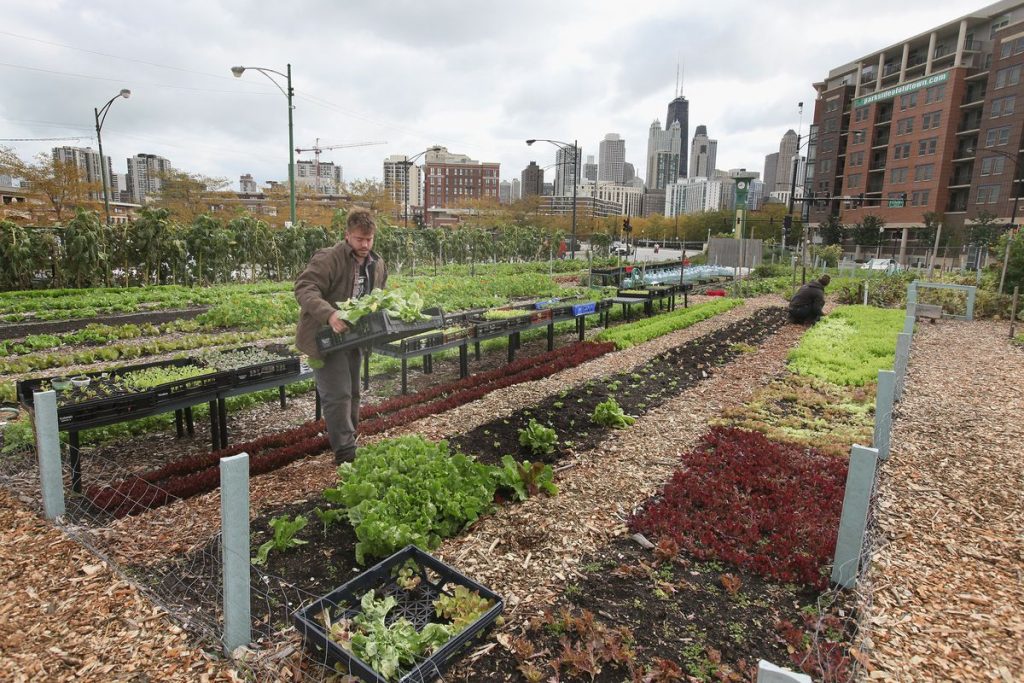Gotham Greens, a prominent player in urban agriculture, has unveiled its ambitious proposal for a sprawling rooftop farm in Brooklyn, New York. This investment highlights the increasing appeal of urban farming, a trend driven by advancements in agricultural technology, or AgTech.
Urban farming involves a range of practices that integrate food production into cities. Community gardens, rooftop greenhouses, and even vertical farms in skyscrapers are all part of this trend. Advocates of urban farming highlight the positive impact it has on the environment and society. Supporting locally grown food not only helps reduce transportation emissions but also strengthens the bond between consumers and their food source.
AgTech: A Blessing for Urban Farms
Although urban farming provides a glimpse into a more sustainable future, it encounters various challenges. Constraints on space and resources can hurt productivity. This is where AgTech comes into play. AgTech companies focus on developing technologies that enhance urban farming practices.
One important aspect to consider is optimizing productivity in limited areas. Hydroponics and aeroponics, for example, remove the reliance on soil, enabling plants to thrive in nutrient-rich water or mist. These techniques not only save space but also allow for precise management of factors such as lighting and nutrients, resulting in increased productivity.
Vertical Farms: An Innovative Approach
Vertical farms expand upon this concept. Picture a towering structure solely focused on cultivating crops. Vertical farms utilize a clever design that allows for maximum growing space in a small area. LED lighting is highly effective for promoting plant growth, while advanced climate control systems maintain ideal conditions. Although the upfront costs may be substantial, vertical farms offer remarkable productivity and reduce dependence on natural resources.

Looking Beyond Efficiency: Exploring the Social Impact of Urban Farming
Urban farming offers a range of advantages that go beyond mere efficiency and sustainability. Community gardens offer valuable chances for building social connections and promoting environmental education, particularly in underprivileged communities. Urban farms can also generate employment opportunities and enhance a city’s overall resilience by offering a nearby supply of fresh produce. Research has indicated that having access to fresh, locally sourced food can have positive effects on public health outcomes and even increase property values in nearby areas.
The Future of Urban Farming: A Technological Masterpiece
With the continuous evolution of AgTech, urban farming is set to have a significant impact on feeding our expanding cities. Advancements in automation, data analysis, and even artificial intelligence will continue to enhance efficiency and resource management. Envision a future where advanced technology revolutionizes agriculture, with automated systems managing crops in vertical farms. Cutting-edge AI algorithms continuously analyze real-time data on plant health, nutrient levels, and environmental factors to optimize growing conditions. This advanced system will not only increase productivity but also reduce inefficiencies and conserve resources.
Challenges and Opportunities
Despite the potential, urban farming still encounters obstacles. Careful planning is necessary to integrate these farms into existing urban infrastructure. It is crucial to tackle zoning regulations and ensure access to water and electricity. Furthermore, it is essential to prioritize the long-term success of urban farms, particularly those on a smaller scale, by ensuring their economic viability.
Nevertheless, the increasing consumer demand for local, sustainable food presents substantial prospects. Working together, urban farmers, governments, and tech companies can create a future where cities play an active role in food production, rather than just being consumers.
The growing popularity of urban farming is a clear demonstration of human creativity. Through the adoption of technological advancements and forward-thinking approaches, we have the potential to foster a more sustainable and resilient food system for the future, with the establishment of rooftop farms serving as a stepping stone towards this goal. This movement not only offers the potential for city dwellers to enjoy fresher and healthier food but also encourages a stronger bond with the natural world and a more robust urban environment.











